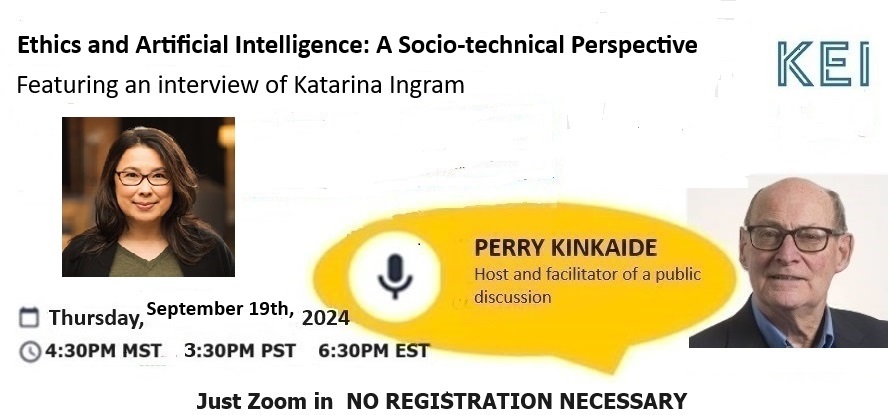
Last week's webinar "Is Collective Intelligence A Threat to Individuality?" featuring an introduction and facilitated discussion with Greg MacGillivray, Randal Adcock, and Keff Krehmer that can now be viewed HERE The webinar was extraordinary discussing just what is collective intelligence but also its presence throughout the evolutionary hierarchy other than with humanity. While delving also into the unintended consequences and ethics of collective intelligence, that will be further discussed this week - see the article by Katrina Ingram below, last week's contributions are worthy of a thank you ...
Thank you Randal for pointing out that collective intelligence appears everywhere in organic life. And - Jeff, thank you for sharing the fascinating demonstration of planaria regrowing its head, a process that, as portrayed in the video HERE (others below), demonstrating collective intelligence that appears even at the cellular level, where cells, by drawing on their DNA, exhibit purposeful intelligence.
https://www.youtube.com/shorts/XyhQ94W_q9E https://www.youtube.com/shorts/cAwr_t6f4o0
I continue to search for an explanation for how the transfer of a "memory" occurs when injecting proteins from trained to untrained laboratory rats as I demonstrated in my MSc research. At the time the transfer was demonstrable; it was the underlying biochemical mechanism that was a mystery. We now know that a stem cell demonstrates collective intelligence likely drawing on it's DNA to regenerate damaged tissue. Animals similarly display collective intelligence, behaving and deciding together simultaneously: a school (fish), gaggle (geese), swarm (bees), pack (wolves), flock (birds), pod (whales), mob (kangaroos), colony (ants), troops (chimpanzees), kaleidoscope (butterflies), herd (lemmings). Why not humans?
The use of collective intelligence to solve humanity’s societal challenges remains elusive, though it may lie ahead in our evolution. Generative AI and global institutions are tools for pursuing global collaboration, not yet demonstrated. Some fear collective intelligence in humans would be at the price of sacrificing individuality. Others seek it t advance research and achieve instantaneous decision-making, as we witness in animals and in our own individual consciousness.
Greg highlighted the value of "collaboration," where people together demonstrate creative intelligence—the contribution being greater than the sum of its parts. Global collaboration remains to be achieved, but may not require us to forgo our individuality; rather, it relies on it. This is analogous to what DNA does for planaria and what collective animal behavior demonstrates: humanity drawing on the intelligence and experience of each of its members thus merging public and private interests.
Another example of collective intelligence is our conscious (and unconscious) experience, where somehow "we" instantly synthesize billions of data points, or "memories," to make decisions in the ebb and flow of our everyday conscious (and unconscious) lives.
Thank you, Jeff, Greg, and Randal. - Editor
Ethics of Artificial Intelligence: Navigating Socio-Technical Challenges contributed by Katrina Ingram

Katrina Ingram is the Founder and CEO of Ethically Aligned AI, a company focused on helping organizations to drive better outcomes in the design, development and deployment of AI systems. A seasoned executive, Katrina has over two decades of experience running both not for profit and corporate organizations in the technology and media sectors as well as experience in the public sector. She is a member of DAMA (data management professionals) and volunteers with several AI ethics organizations. She was named to the 100 Brilliant Women in AI Ethics list. Katrina holds an undergrad idegree in business administration from Simon Fraser University, a Master of Arts in communications and technology from the University of Alberta and is an IAPP certified information privacy professional (CIPP/C). She combines her love of audio and interest in AI as the host of the podcast, AI4Society Dialogues. Katrina developed Canada's first micro-credential in AI Ethics in partnership with Athabasca University. She currently teaches at the University of Alberta and MacEwan University as a sessional instructor in the Arts and Cultural Management program. She is a member of the Calgary Police Services Technology Ethics Committee and recently served as the City of Edmonton's Data Ethics Advisor.
Artificial Intelligence (AI) is rapidly transforming our world, with applications that touch nearly every aspect of life. However, as AI systems become more integrated into society, ethical concerns surrounding their use are becoming increasingly urgent. To fully grasp these implications, it is essential to understand AI not just as a technology, but as an ideology deeply embedded in our cultural imagination.
As Katrina Ingram, the Founder and CEO of Ethically Aligned AI, points out, "AI is not new. It’s close to 70-years old. Yet, the term AI has meant different things since it was first coined in 1956, moving from symbolic expert systems to today’s probabilistic machine learning technologies." With over 20 years of experience in technology, media, and the public sector, Ingram's perspective underscores how AI's evolution, from symbolic logic-based systems to complex machine learning algorithms, reflects its ongoing reinvention as 'the next new thing.' This phenomenon highlights both AI's potential and its persistent elusiveness. Despite impressive advancements, particularly with the rise of generative AI systems like chatbots, the dream of Artificial General Intelligence (AGI) remains distant, perpetually just out of reach.
Ethics plays a crucial role in navigating the socio-technical challenges posed by AI. Ingram, who also hosts the AI4Society Dialogues podcast and developed Canada’s first micro-credential in AI Ethics, notes that "AI ethics is a field that focuses on the ethical issues and questions raised by the development and deployment of AI systems." These systems, operating quietly in the background for years, have already been shaping decisions in areas such as employment, law enforcement, healthcare, and financial services. With the recent surge in generative AI technologies, which offer direct consumer access and new functionalities, the ethical questions have only multiplied.
One of the central ethical concerns is how AI systems can perpetuate and even amplify existing societal biases. When AI algorithms are trained on biased data, they can produce outcomes that unfairly disadvantage certain groups, raising serious questions about fairness and justice. Transparency is another significant issue, as many AI systems function as "black boxes," making decisions in ways that are opaque even to their developers. This lack of transparency complicates accountability, making it difficult to understand or challenge the decisions made by AI.
Moreover, privacy concerns are paramount in the age of AI, as these systems often require extensive personal data to function effectively. The use of AI in surveillance, for example, raises significant ethical dilemmas about the balance between security and individual privacy rights. Finally, the impact of AI on employment must be considered, as automation threatens to displace workers in various sectors, potentially exacerbating economic inequality.
In addressing these challenges, ethical deliberation offers valuable insights. It allows society to weigh the "should" questions, providing guidance on how to mitigate the risks associated with AI development and deployment. As Ingram, who also teaches at the University of Alberta and MacEwan University and serves on various AI ethics committees, suggests, ethics can help us critically examine how—or even if—we should engage with these systems, ensuring that AI serves the broader goals of equity, transparency, and human well-being. By approaching AI with a keen awareness of its socio-technical dimensions, we can better navigate the complex landscape of its ethical implications.

https://us02web.zoom.us/j/84258596166?pw..

https://us02web.zoom.us/j/84258596166?pw..

Editor@KEInetwork.net

Visit KEInetwork.net